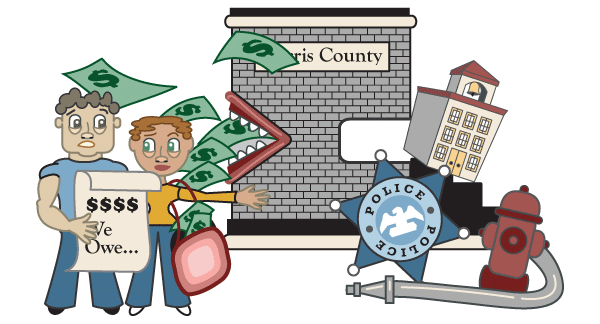|
As one might imagine, many of the details of how county government operates are included in Article V (the Judicial Department), where the county commissioner's court and several other county offices are specified. But other areas of the Texas Constitution include important details on the operation and operational restrictions on counties and their public officers, including:
- Apportionment for representation in the state legislature
"...whenever a single county has sufficient population to be entitled to a Representative, such county shall be formed into a separate Representative District, and when two or more counties are required to make up the ratio of representation, such counties shall be contiguous to each other..." (Article 3, Section 26)
- Taxation of lands for public education
"All lands heretofore, or hereafter granted to the several counties of this State for educational purposes, are of right the property of said counties respectively, to which they were granted, and title thereto is vested in said counties, and no adverse possession or limitation shall ever be available against the title of any county. Each county may sell or dispose of its lands in whole or in part, in manner to be provided by the Commissioners Court of the county." (Article VII, Section 6)
- Occupation tax
"...the occupation tax levied by any county, city or town, for any year, on persons or corporations pursuing any profession or business, shall not exceed one-half of the tax levied by the State for the same period on such profession or business." (Article VIII, Section 1)
- Assessment and taxation of property
"All property, whether owned by persons or corporations, shall be assessed for taxation, and the taxes paid in the county where situated, ..."
- Exemption of local public property from taxation or forced sale
"The property of counties, cities and towns owned and held only for public purposes, such as public buildings and the sites therefor, fire engines and the furniture thereof, and all property used, or intended for extinguishing fires, public grounds and all other property devoted exclusively to the use and benefit of the public shall be exempt from forced sale and from taxation, ..." (Article XI, Section 9)
- Multiple paid public offices
"No person shall hold or exercise, at the same time, more than one civil office of emolument, except that of justice of the peace, county commissioner, notary public, and postmaster unless otherwise specially provided herein." (Article XVI, Section 40)
In addition, the Texas Constitution contains numerous other provisions that either empower or prohibit actions by county government. Some of the things counties are empowered to do include: constructing seawalls in coastal counties, prohibiting alcohol sales, establishing a poor house or farm for taking care of indigent or poor inhabitants.
|

